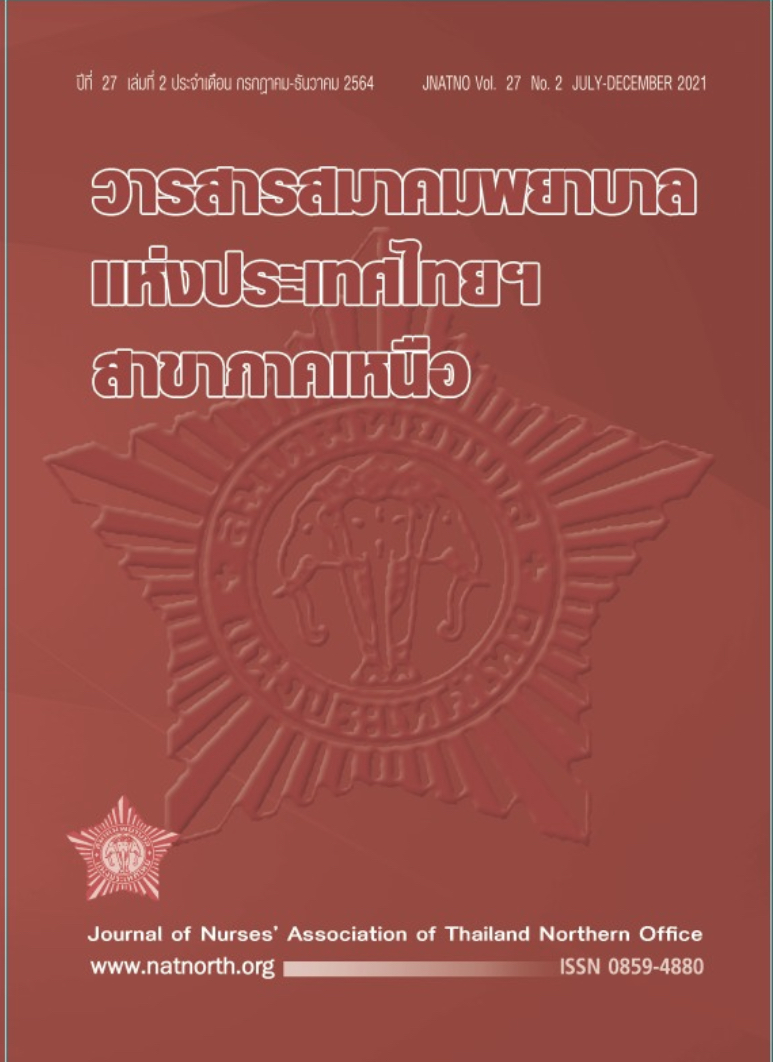Effects of Online Teaching and Learning on Learning Outcomes according to TQF in Nursing Students
คำสำคัญ:
การเรียนการสอนออนไลน์, กรอบมาตรฐานระดับอุดมศึกษาแห่งชาติ, นักศึกษาพยาบาลบทคัดย่อ
การวิจัยกึ่งทดลอง แบบกลุ่มเดียว วัดหลังการทดลองนี้มีวัตถุประสงค์เพื่อศึกษาผลของการเรียน การสอนออนไลน์ต่อผลการเรียนรู้ตามกรอบมาตรฐานระดับอุดมศึกษาแห่งชาติของนักศึกษาพยาบาล กลุ่มตัวอย่างประกอบด้วย นักศึกษาพยาบาลศาสตร์วิทยาลัยพยาบาลบรมราชชนนีแพร่ ปีการศึกษา 2562 จำนวน 148คน และอาจารย์ที่เกี่ยวข้องกับการจัดการสอนแบบออนไลน์ จำนวน
5 คน เครื่องมือวิจัย ประกอบด้วย 1) คู่มือการเรียนการสอนออนไลน์ผ่านการตรวจสอบความตรงเชิงเนื้อหาโดยผู้ทรงคุณวุฒิ 5 ท่าน ค่าดัชนีความตรงตามเนื้อหาได้0.852) แบบบันทึกจำนวนชั่วโมงของรายวิชาตามหลักสูตรพยาบาลศาสตร์ (หลักสูตรใหม่ พ.ศ. 2558) จำนวนชั่วโมงที่จัดการเรียนการสอนออนไลน์และวิธีการสอนในภาคการศึกษาที่2 ปีการศึกษา 2562 ค่าดัชนีความสอดคล้อง
เท่ากับ 1.00 3) แบบประเมินผลการเรียนรู้ตามกรอบมาตรฐานระดับอุดมศึกษาแห่งชาติค่าดัชนี ความสอดคล้อง เท่ากับ 0.98 มีค่าความเชื่อมั่นเท่ากับ 0.99 4) แบบสอบถามความพึงพอใจต่อการเรียนการสอนออนไลน์ค�ำนวณค่าดัชนีความสอดคล้อง เท่ากับ 0.98 มีค่าความเชื่อมั่นเท่ากับ 0.99 และ 5) แนวคำถามที่ใช้สัมภาษณ์ค่าดัชนีความสอดคล้อง เท่ากับ 0.96
ผลการวิจัย พบว่า นักศึกษาพยาบาลทุกชั้นปีมีผลการเรียนรู้ตามกรอบมาตรฐานระดับอุดมศึกษาแห่งชาติในภาพรวมอยู่ในระดับมาก โดยนักศึกษาพยาบาลชั้นปีที่ 1 2 และ 3 มีผลการเรียนรู้ตามกรอบมาตรฐานระดับอุดมศึกษาแห่งชาติเฉลี่ย = 4.23 (S.D. = .57), 4.06 (S.D. = .59) และ 3.98 (S.D. = .58) ตามลeดับ นักศึกษาทุกชั้นปีมีความพึงพอใจต่อกระบวนการเรียนการสอนออนไลน์ในภาพรวมอยู่ในระดับมาก โดยนักศึกษาพยาบาลชั้นปีที่1 2 และ 3 มีความพึงพอใจเฉลี่ย =4.01(S.D. = .49), 4.10(S.D. = .59) และ 3.97(S.D. = .64) ตามลำดับ ผลการสัมภาษณ์นักศึกษาและอาจารย์พบว่า นักศึกษาสามารถบรรลุผลการเรียนรู้ตามกรอบมาตรฐานระดับอุดมศึกษาแห่งชาติของแต่ละรายวิชาได้โดยมีผลลัพธ์การเรียนรู้ด้านคุณธรรมจริยธรรมมากที่สุดซึ่งนักศึกษาต้องปรับเปลี่ยนพฤติกรรมเป็นผู้ที่มีความกระตือรือร้น มีความรับผิดชอบในการเรียนและส่งงานตามกeหนดเวลา ต้องตั้งใจเรียนและใช้ความพยายามในการเรียนมากขึ้น ต้องบริหารเวลาของตนเอง มีความซื่อสัตย์ไม่ลอกผลงานผู้อื่น และอาจารย์สามารถออกแบบกิจกรรมในการเรียนการสอนออนไลน์ที่เสริมสร้างให้นักศึกษาบรรลุมาตรฐานของการเรียนรู้ตามกรอบมาตรฐานระดับอุดมศึกษาแห่งชาติทั้ง 5 ด้านได้การเรียนการสอนออนไลน์ไม่ได้เป็นข้อจำกัดในการเกิดผลลัพธ์การเรียนรู้ และนักศึกษาทุกชั้นปีมีความพึงพอใจต่อการเรียนการสอนออนไลน์ ภาพรวมอยู่ระดับมาก โดยมีความพึงพอใจหัวข้อ การชี้แจง มคอ. 3-4 และวัตถุประสงค์ของรายวิชาชัดเจนมากที่สุด และพึงพอใจในหัวข้อ สิ่งแวดล้อมในห้องเรียนออนไลน์มีความเหมาะสมน้อยที่สุด
เอกสารอ้างอิง
สานักมาตรฐานและคุณภาพอุดมศึกษา. ํ คู่มือการประกันคุณภาพการศึกษาภายใน ระดับอุดมศึกษาฉบับ ปีการศึกษา 2557. กรุงเทพฯ: ม.ป.พ; 2557.
Sirisomboon,P. Characteristicsof Graduates According to Thai Qualifications Framework for Higher Education (TQF: HEd) in Southeast Bangkok College, 2013-2014 (Batch#15) [online]. SB Journal. 2016; 2(2): 55-67. (in Thai)
กระทรวงศึกษาธิการ. ประกาศกระทรวงศึกษาธิการเรื่อง กรอบมาตรฐานคุณวุฒิระดับอุดมศึกษาแห่งชาติพ.ศ. 2552. สืบค้นวันที่10 เมษายน 2563 จาก http://www.mua.go.th/users/tqf-hed/research/3_2558.PDF; 2552.
Intaranongpai, S. & Kotchakot, J. The Learning Outcome under the Qualifications Framework for Higher Education (TQF) in Community Nursing Practicum Subject, Bachelor of Nursing Science [online]. JOPN 2017;9(2):104-14. (in Thai)
Cheevakasemsook, A. Nursing teaching and learning management with blended learning in new normal era. [online]. J Nurs Health Research 2021;37(1):25-37. (in Thai)
Wayo, W., Charoennukul, A., Kankaynat, C. & Konyai, J. Online Learning Under the COVID-19Epidermic: Concepts add Applications of Teaching and Learning management [online]. RHPC 9 Journal 2020;14 (34):285-98. (In Thai)
Siritarangsri,B., Suwattipong, C., Noimuenwai,P., Kaewsarn, P. & Thongkhamrod, R. Using ICT to replace the face-to-face seminar for teaching and learning in nursing administration. [online]. JRTN 2018; 19(Supplement): 203-12. (In Thai)
Siritarangsri, B. The management of online Learning and teaching: Towards the Professional standards framework for teaching and supporting learning in higher education. [online]. J Chulabhorn Royal Acad 2020;2(3):1-17. (In Thai)
ฐาปนีย์ธรรมเมธา.อีเลิร์นนิง:จากทฤษฎีสู่การปฏิบัติ (e-Learning : From theory to practice). นนทบุรี: สหมิตรพริ้งติ้งแอนด์พับลิสชิ่ง; 2557.
Paowana, W. The instructional development in vital signs measurement through the Learning management system. [online]. JPCN, Phetchaburi Province 2020;3(3):112-28. (In Thai)
อารีวรรณ อ่วมตานี.การวิจัยเชิงคุณภาพทางการพยาบาล: Qualitative research in nursing. กรุงเทพฯ: โรงพิมพ์แห่งจุฬาลงกรณ์มหาวิทยาลัย. 2559.
Waisurasing, L. & Noparoojjinda, S. The development of instructional model using authentic learning approach to enhance achievement and critical thinking ability of nursing students, Boromarajajonani College of Nursing, Suohanburi. [online]. J Nurs Edu 2011;4(3):63-77. (In Thai).
Kosawanon, S., Rungamornrat, S.& Panbangpra, S. Effect of case study teaching method on critical thinking in nursing students. [online]. J Nurs Science 2015;33(3):99-108. (In Thai).
Jaijoy, K. & Kamdaeng, P. Learning outcome and satisfaction of nursing students on the Student-centered teaching in nursing informatics class of McCormick Faculty of Nursing, Payap University. [online]. JNATNO 2020;25(2):26-39. (In Thai).
Prasertsong, C., Sanghirunruttana, J. & Kladkaew, P. The Factor related to stress of online learning due to the COVID-19 situation among Nursing students [online]. J Somdet Chaopraya Inst Psychiat 2021;15(1):14-28. (In Thai).
ดาวน์โหลด
เผยแพร่แล้ว
รูปแบบการอ้างอิง
ฉบับ
ประเภทบทความ
สัญญาอนุญาต
บทความที่ได้รับการตีพิมพ์เป็นลิขสิทธิ์ของสมาคมพยาบาลแห่งประเทศไทยฯ สาขาภาคเหนือ
เนื้อหาและข้อคิดเห็นใดๆ ที่ตีพิมพ์ในวารสารสมาคมพยาบาลฯ ถือเป็นความรับผิดชอบของผู้เขียนเท่านั้น ผู้เขียนบทความต้องศึกษารายละเอียดหลักเกณฑ์การจัดทำต้นฉบับตามที่วารสารกำหนด และเนื้อหาส่วนภาษาอังกฤษต้องได้รับการตรวจสอบจากเจ้าของภาษามาแล้ว


